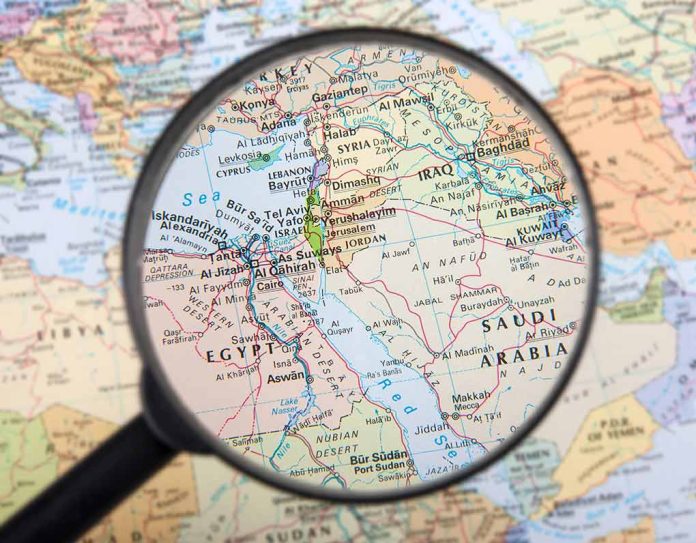
Israel’s precision strikes deep inside Iran have killed IRGC Commander Hossein Salami and several top Iranian nuclear scientists, potentially decapitating Iran’s military leadership in a dramatic escalation that marks the most significant Israeli offensive against the Islamic Republic in decades.
Key Takeaways
- Iranian state media confirms Revolutionary Guards Commander Hossein Salami was killed in Israeli strikes that targeted military and nuclear sites
- Multiple high-value targets eliminated including IRGC Major General Gholam Ali Rashid and nuclear scientist Dr. Fereydoun Abbasi along with his family
- Operation Rising Lion involved dozens of Israeli aircraft conducting coordinated strikes across Iran
- Israel Defense Forces stated the operation aimed to prevent Iran from obtaining nuclear weapons
- U.S. Secretary of State Marco Rubio confirmed America was not involved in the strikes but remains in contact with regional partners
Israeli Strikes Decapitate Iranian Military Leadership
In a massive coordinated attack, dozens of Israeli aircraft conducted precision strikes against Iranian military targets and nuclear sites early Friday morning. The operation, dubbed “Rising Lion,” has reportedly killed several high-ranking Iranian officials, most notably Islamic Revolutionary Guard Corps (IRGC) Commander Hossein Salami. Iranian state media outlets Tasnim and Mehr news agencies confirmed Salami’s death, referring to him as having been “martyred” in the attack. IRGC Major General Gholam Ali Rashid was also reportedly killed in the Israeli strikes, dealing a severe blow to Iran’s military command structure.
“Iranian state media confirmed the killing of Iran’s Revolutionary Guards Commander Hossein Salami in the opening strike of Israel’s Operation Rising Lion, early Friday morning,” reported Yonah Jeremy Bob and Jerusalem Post Staff.
🚨🇮🇱🇮🇷 BREAKING: TOP IRGC COMMANDERS, NUCLEAR CHIEF KILLED IN ISRAELI STRIKES ON TEHRAN
Iranian state media reports that IRGC Commander-in-Chief Hossein Salami, former Atomic Energy chief Fereydoon Abbasi-Davani, and Khatam-al Anbiya Central HQ Commander Major General Gholam Ali… https://t.co/2U6IcgAGAT pic.twitter.com/Vf2IIkvglC
— Mario Nawfal (@MarioNawfal) June 13, 2025
Nuclear Scientists Targeted in Coordinated Attack
Beyond military leadership, Israel’s strikes specifically targeted Iran’s nuclear infrastructure and personnel. Dr. Fereydoun Abbasi, a prominent nuclear scientist, was assassinated along with his wife and child. Additionally, Dr. Abdulhamid Minouchehr, a dean at Shahid Beheshti University, and Professor Ahmadreza Zolfaghari from the same institution were killed in the attack. These targeted killings suggest Israel’s operation aimed to disrupt Iran’s nuclear program by eliminating key scientific personnel who possess specialized knowledge critical to Iran’s nuclear ambitions.
“Regime state media claimed that a number of children and civilians were killed in the strikes, although this claim has not been authenticated,” noted Yonah Jeremy Bob and Jerusalem Post Staff.
The Israeli Defense Forces stated that the operation was designed to prevent Iran from obtaining nuclear weapons capability, a longstanding concern for Israel and Western nations. Israeli Defense Minister Israel Katz announced a “special state of emergency” in Israel following the preemptive strike, indicating the government’s awareness of potential retaliatory actions from Iran or its proxies throughout the region. This emergency declaration suggests Israel is bracing for possible counterattacks in the coming days.
U.S. Position and Regional Tensions
U.S. Secretary of State Marco Rubio was quick to distance America from the operation while acknowledging Israel’s right to self-defense. “Tonight, Israel took unilateral action against Iran. We are not involved in strikes against Iran and our top priority is protecting American forces in the region,” Rubio stated. This carefully worded response reflects the delicate balance the Trump administration is striking between supporting its closest Middle Eastern ally while avoiding direct military confrontation with Iran.
“Israel advised us that they believe this action was necessary for its self-defense. President Trump and the Administration have taken all necessary steps to protect our forces and remain in close contact with our regional partners. Let me be clear: Iran should not target U.S. interests or personnel,” said U.S. Secretary of State Marco Rubio.
The U.S. Embassy in Baghdad was reportedly preparing for an evacuation of nonessential personnel due to security threats, highlighting concerns about Iranian retaliation potentially targeting American interests in the region. This precautionary measure underscores the volatility of the situation and the possibility that Iran might respond by activating its proxy forces in Iraq, Lebanon, Syria, and Yemen. President Trump has emphasized a commitment to diplomatic resolution of the Iran nuclear issue, though the Israeli strikes may complicate such efforts.
Uncertain Response and Regional Implications
It remains unclear how or when Iran will respond to these devastating strikes. The killing of such high-profile military leaders and nuclear scientists represents one of the most significant blows to Iran’s security apparatus and nuclear program in recent history. Regional analysts are closely monitoring Iran’s Supreme Leader Ali Khamenei and other surviving leaders for indications of their planned response. The elimination of Salami, who was a hardline anti-Israel voice within the Iranian regime, creates a leadership vacuum in the IRGC at a critical moment of heightened tensions.
The targeted strikes against Iranian nuclear facilities align with Israel’s longstanding “Begin Doctrine,” which asserts Israel’s right to prevent hostile regimes from acquiring nuclear weapons capabilities that could threaten its existence. With the strikes reportedly hitting dozens of targets, Israel has demonstrated both intelligence capabilities that allowed it to identify and locate high-value targets and the military capacity to conduct complex operations deep within Iranian territory. This operation represents a major escalation in the shadow war between Israel and Iran that has been ongoing for years.



